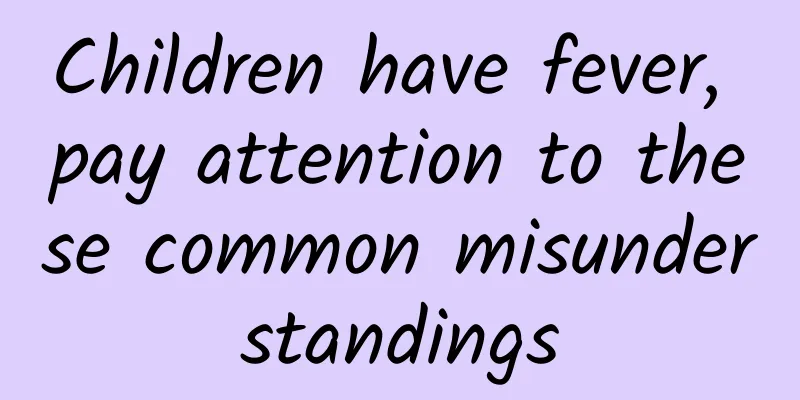Children have fever, pay attention to these common misunderstandings

|
Children's fever is a headache for many parents. Many children are listless and their faces are red after fever. Parents see this and are anxious, so they adopt many inappropriate cooling methods, which not only fail to reduce the temperature, but also make the child's condition worse. In fact, fever is an external manifestation of inflammation in our body. Parents should correctly understand children's fever and never fall into the misunderstanding of cooling and delay the child. Today, let's talk about the common misunderstandings about children's fever and introduce you to the correct way to deal with children's fever. Hurry up and learn! The picture comes from the Internet 1. Thinking that fever is a bad thing Fever is relatively common among children, but many parents do not understand the significance of fever, which leads to unscientific treatment of fever. Some parents mistakenly believe that fever is a bad thing and worry too much about their children's physical condition. In fact, fever is a normal response of the immune system to fight infection. Fever can kill germs and encourage children to produce antibodies, thereby improving the body's immunity, which is very beneficial for children's physical recovery. The picture comes from the Internet 2. Worrying too much about a low-grade fever Some parents become worried when they find their children have a low fever, and even give their children antipyretics when the temperature is less than 38.5℃. In fact, this is incorrect. A low fever may be a normal physiological reaction caused by a minor infection. As a parent, you should focus on observing your child's mental state and ability to move, rather than just paying attention to changes in body temperature. If the child can eat, drink water and play normally during a low fever, and is in good spirits, then we can choose to observe for a period of time and give him enough rest and nutritional support. However, if the child has other obvious symptoms, such as diarrhea, cough, etc., or the low fever lasts for too long, then we need to take the child to the doctor in time to ensure that the child receives proper treatment and care. 3. Focusing on cooling only and ignoring the root cause Some parents pay too much attention to cooling down their children when they have a fever, and blindly use antipyretic drugs, but this only temporarily controls the body temperature, but does not find out the root cause of the fever. If the cause is not found out in time and appropriate treatment measures are not taken, the condition may continue to worsen and even lead to more serious consequences. There are many reasons for children to have a fever, such as various common viral infections such as colds, influenza, and otitis media. In addition, other potential causes may include bacterial infections, food poisoning, and allergic reactions. Therefore, in order to properly deal with the problem of fever, we should consult a doctor in time to help us find the cause and carry out appropriate treatment according to the doctor's guidance. At the same time, parents should also pay attention to the duration and symptoms of the child's fever. If the child's high fever lasts for more than 48 hours, or if there are symptoms such as coma and difficulty breathing, the child should be taken to the doctor immediately for further examination and treatment. 4. Abuse of antipyretic drugs Abuse of antipyretics is a mistake that many parents make when their children have a fever. Parents may think that antipyretics can quickly lower their children's body temperature and relieve discomfort. However, it should be noted that antipyretics can only temporarily relieve fever symptoms and cannot solve the fundamental problem that causes fever. Long-term abuse of antipyretics will burden the child's liver and kidneys. The ingredients in antipyretics are usually metabolized by the liver and excreted from the body through the kidneys. Excessive use or long-term abuse will increase the burden on these organs and may cause liver and kidney damage. At the same time, abuse of antipyretics may mask more serious problems. Fever is the body's natural response to fight germs and infections. By raising body temperature to enhance the activity of the immune system, if antipyretics are used too early, this normal physiological response may be inhibited, causing the condition to further deteriorate without being discovered, and delaying the best time for treatment. In addition, abuse of antipyretics may also lead to drug tolerance. If the same antipyretic drug is used frequently, the child's body will gradually develop tolerance to the drug, so that a larger dose is required to achieve the same antipyretic effect, which undoubtedly adds unnecessary burden to the child's body. The correct way to use antipyretic drugs is: antipyretic drugs can only be used when the body temperature exceeds 38.5℃, and the interval between two uses must not be less than 4 to 6 hours. The picture comes from the Internet 5. Not knowing the severity of the fever Many parents only know to use a thermometer to measure the temperature of their children when they have a fever, but they don't know how to define its severity. In fact, there are two key points in fever that require special attention from parents. First: a continuous high fever of more than 38.5℃ is a signal for timely medical treatment. A high fever may indicate that the body is being attacked by some infection or disease. At this time, a professional doctor is needed to conduct a comprehensive examination and treatment of the child. In a high temperature environment, the child's metabolic rate will accelerate and the pathogens will become more rampant. Therefore, we cannot take such situations lightly; second: an axillary temperature of more than 37.5 degrees Celsius should alert parents. Although not every low fever requires emergency treatment, an axillary temperature exceeding normal means that the child's body is fighting a pathogen, and we may need to take further intervention measures. In this case, parents can consult a doctor to discuss whether further treatment and observation are needed based on the specific situation of the child. The picture comes from the Internet 6. Ignoring the risk of dehydration Children tend to sweat when they have a fever, which increases the risk of dehydration and requires proper water supplementation. Dehydration may lead to many adverse consequences, such as increased blood viscosity, which puts a burden on the heart and other organs; electrolyte imbalance, causing symptoms such as muscle spasms and cramps; decreased immunity, making the body more susceptible to other infections. Therefore, parents should pay special attention to correcting dehydration in a timely manner. In order to prevent children from dehydration, we need to replenish children with enough water when they have a fever, and give them more warm water. At the same time, you can also give children some light food, such as fruits and vegetables containing water, such as watermelon, orange, cantaloupe, etc. But it is worth noting that although it is important to replenish water, you should not drink too much water. Drinking too much water may cause gastrointestinal discomfort or even vomiting. It is best to determine the appropriate amount of water to drink according to the child's age and weight, and at the same time, provide them with sufficient water according to their drinking needs. 7. Ignoring other complications Although fever in most children is usually benign, serious complications may occur in some cases. If a child has a severe high fever, the nervous system may be damaged. When the child's body temperature exceeds 40°C, the risk of the nervous system being affected increases. In this case, the child may experience symptoms such as persistent headaches, coma, and even convulsions. At the same time, certain infections may cause children to have symptoms of shortness of breath and difficulty breathing. As the fever worsens, certain infections may spread to the respiratory system and cause lung infections, causing children to cough, shortness of breath, and chest pain. In addition, some children may experience digestive system symptoms such as abdominal pain, vomiting, and diarrhea. If the infection is transferred to other parts, such as the ears, throat, or skin, the child may experience local symptoms and signs. Therefore, parents should pay close attention to their children's fever symptoms and take their children to the hospital in time to avoid delaying the treatment of the disease. The picture comes from the Internet The above are some common misconceptions about children's fever. Do you understand? Fever is an external manifestation. While cooling down, we should find out the cause of the fever and prescribe the right medicine. |
<<: In the winter eye protection campaign, beware of these four eye diseases!
>>: Beware of Diabetic Retinopathy: A Silent Vision Killer
Recommend
Oxytocin administration with uterine contractions and inability to dilate
Generally, women will give birth normally between...
The most expensive container in the world is in you and me.
If a basin of water is not placed properly, the w...
How to eliminate edema during menstruation
Menstruation is a very special physiological phen...
The beginning of spring has arrived, let your children thrive with the energy of heaven and earth!
The air is cool, but it cannot resist the footste...
What can't you eat if you have pelvic inflammation?
In clinical medicine, the types of gynecological ...
Can breasts that have been breastfed recover?
We all know that breast milk is the best source o...
Is cloudy urine a sign of nephritis in women?
Many women have turbid urine, which makes them ve...
Why does Asparagus fern always have yellow leaves? How to remedy the problem of Asparagus fern always having yellow leaves?
Asparagus fern is a plant that is often seen in l...
What causes acne?
Puberty is something everyone goes through. The b...
Reasons why pregnant women have hard stomachs when walking
For pregnant women, physical health needs to be t...
You're throwing away the most nutritious part of the celery!
Celery is a vegetable that everyone buys at home....
Amazing discovery! Fathers drinking coffee can cause fatty liver disease in their offspring
Author: Huang Yanhong Duan Yuechu In the vast fie...
When a woman's sexual desire decreases
Sexual desire is a normal physiological phenomeno...
How to choose the right bowling ball? Where did bowling originate?
Nowadays, bowling has become a fashionable sport ...
Bleeding after insertion
With the increase of life pressure, many families...









